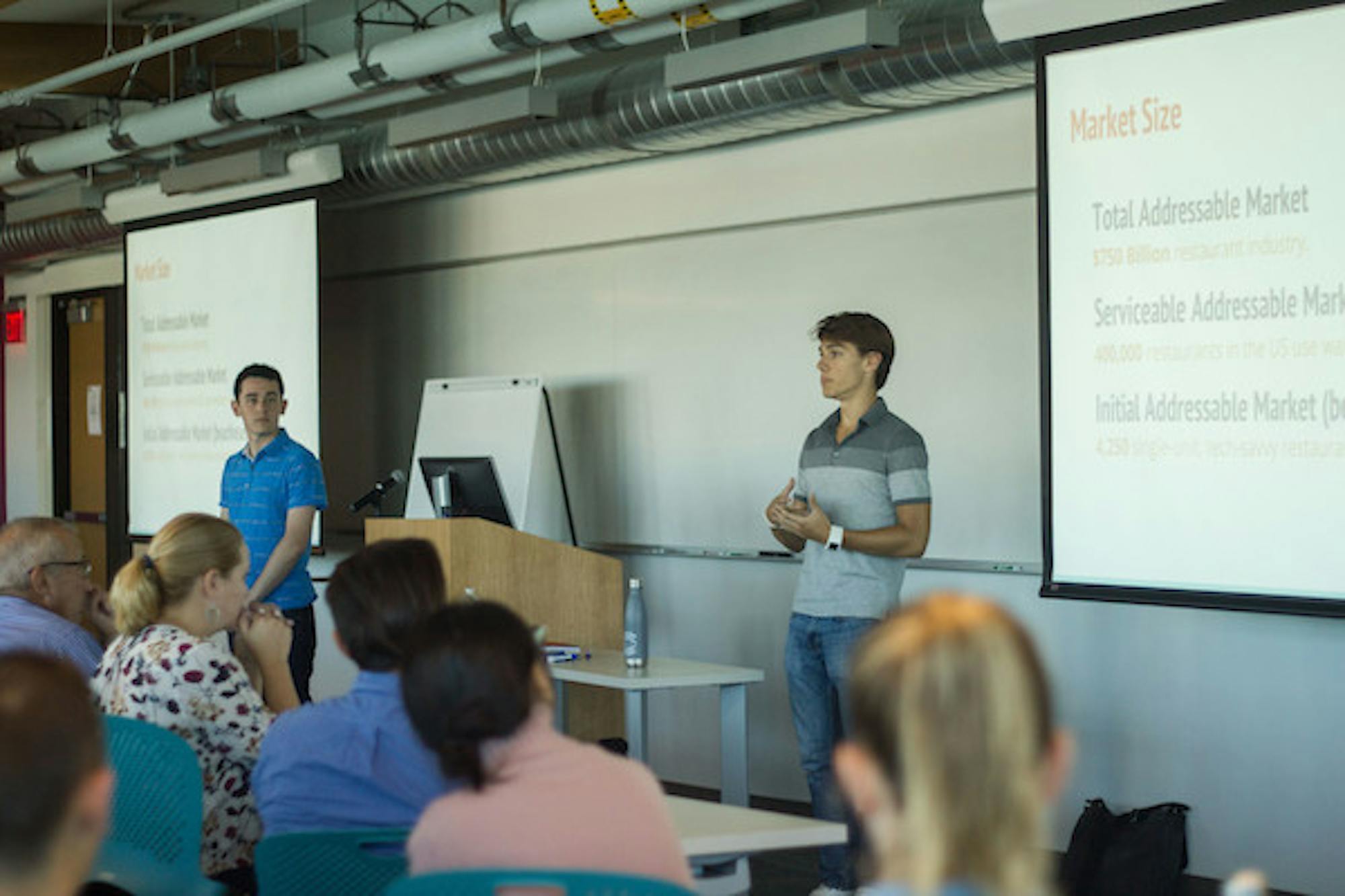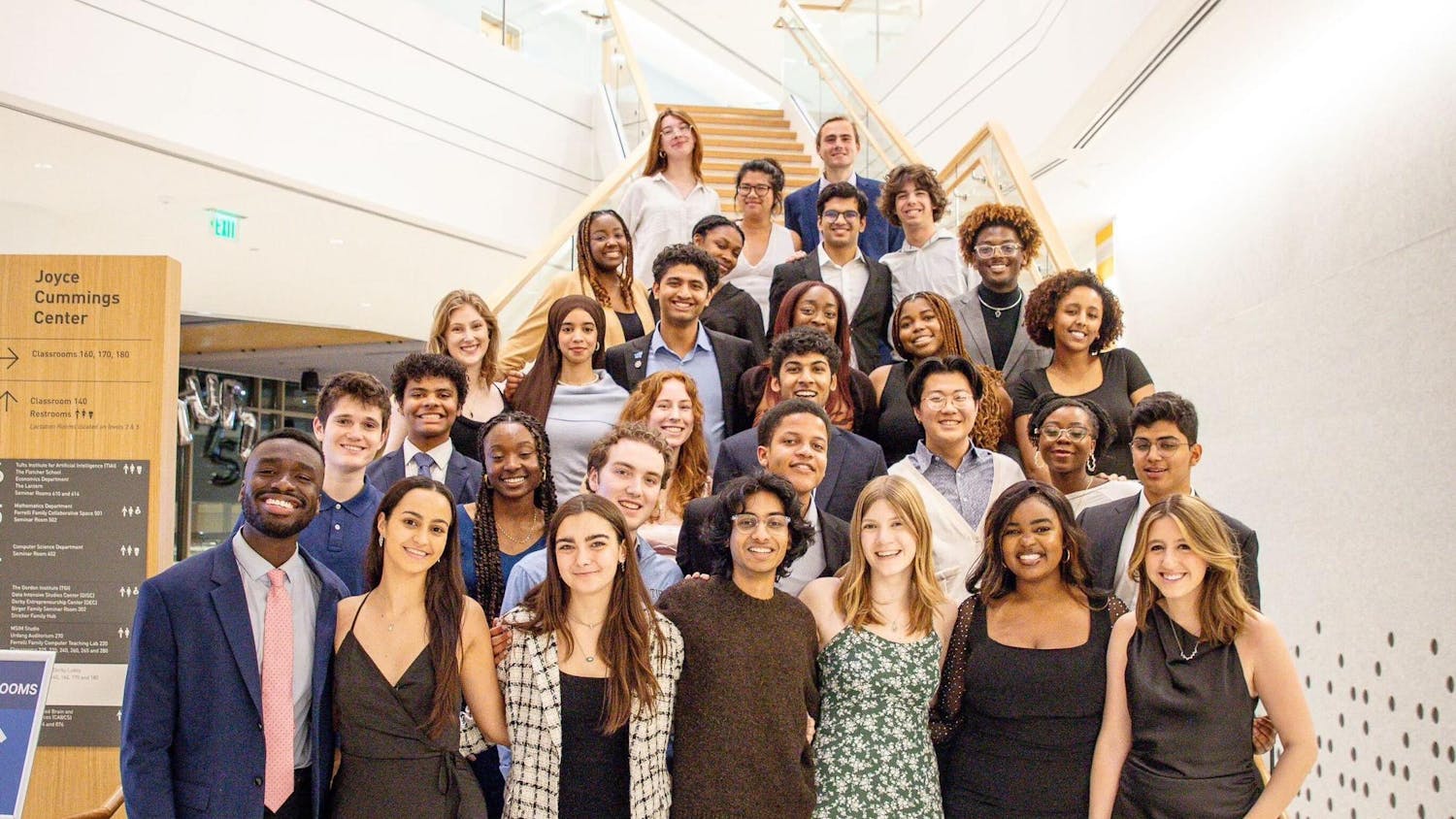Over the weekend, 85 undergraduate and graduate students participated in 3 Day Startup, a 72-hour entrepreneurial workshop program, at the Collaborative Learning and Innovation Complex (CLIC). The event was hosted by the Tufts Entrepreneurial Society(TES) and the Gordon Institute’s Entrepreneurial Leadership Studies(ELS) program, in conjunction with the Austin-based nonprofit 3 Day Startup (3DS), according to 3DS Program Director Shayna Dunitz.
Director of the ELS program Inge Milde said that 111 students signed up for 3DS and 85 were there at the event’s start. The students were School of Arts and Sciences and School of Engineering undergraduate students and graduate students, as well as graduate students from the Fletcher School of Law and Diplomacy and Tufts University School of Dental Medicine.
“This is truly a university-wide program,” Milde said.
From Friday afternoon through Sunday afternoon, 3DS students researched and workshopped startup ideas, Dunitz said.
According to Alex Rappaport, co-director of TES and event organizer, the students were able to choose which of these teams to join based on the ideas presented.
“People in the audience are sitting there, self-selecting, thinking, ‘Oh, that’s an idea I really like,’ or ‘there’s clearly a role for me there,’” Rappaport, a senior, said.
Beyond working on their projects, 3DS participants also attended a "learning module" to learn basic market research and customer discovery skills on Saturday morning, according to Dunitz.
"We talked to the students about how they can go out and talk to real people about this problem they think they're solving, and find out if there's an opportunity in the market," Dunitz said, adding that the students were then sent off campus to find and speak to potential customers.
Later, Dunitz said that the teams brought their startup ideas before a series of mentors with entrepreneurial experience. This exposure further aided the teams in the refinement of their pitches, she said.
Teams spent the remainder of Saturday and much of Sunday preparing for 3DS's final event: a three minute pitch before a panel of individuals with first-hand experience launching startups.
"The teams go over their problem, the market size, their solution and their business model," Dunitz said.
While many students knew how to present a class project, Dunitz said that teaching them how to pitch to investors was an essential aspect of the program.
On Sunday afternoon, each team made its final pitch before fellow program attendees and a judging panel. Among the ideas pitched was a virtual reality program that teaches public speaking skills, a playground that harvests kinetic energy and a tooth-mounted calorie tracker. There were no declared winners of the event.
"I came to [3DS] because I wanted the entrepreneur experience," sophomore Hermes Suen, a member of the team that pitched the playground, said, noting that while he believes in his team's vision, he does not expect to pursue it.
One of the major goals for this year’s entrepreneurial event was to expand the educational diversity of participating students to ensure a great variety of students gain entrepreneurial experience, according to Milde.
“It's been a big mission of mine to create opportunities and to share opportunities that our program is providing … so that all people, whether they’re students, graduate students, researchers, post-docs, faculty, staff ... know about all the entrepreneurial opportunities,” Milde said.
An educationally-varied participant base was integral for the program’s success, according to Rappaport.
“You get a a diverse level of experiences, so you get this fun mix of freshmen who are excited and don’t know what to do, [as well as] jaded grad students who know what to do,” he said.
Director of the ELS program Inge Milde said that 111 students signed up for 3DS and 85 were there at the event’s start. The students were School of Arts and Sciences and School of Engineering undergraduate students and graduate students, as well as graduate students from the Fletcher School of Law and Diplomacy and Tufts University School of Dental Medicine.
“This is truly a university-wide program,” Milde said.
From Friday afternoon through Sunday afternoon, 3DS students researched and workshopped startup ideas, Dunitz said.
At the start of the event, students broke into 10 brainstorming groups, according to sophomore Woodrow Nimoityn, who participated in the program as a part of his ELS course.
People with startup ideas pitched them to their brainstorming groups. Each group selected two ideas within their group, and then pitched their two ideas to all 85 participants. Of the 22 ideas presented to the entire audience, the 12 most promising were chosen by a blind vote of students in attendance, according to Dunitz.
According to Alex Rappaport, co-director of TES and event organizer, the students were able to choose which of these teams to join based on the ideas presented.
“People in the audience are sitting there, self-selecting, thinking, ‘Oh, that’s an idea I really like,’ or ‘there’s clearly a role for me there,’” Rappaport, a senior, said.
Beyond working on their projects, 3DS participants also attended a "learning module" to learn basic market research and customer discovery skills on Saturday morning, according to Dunitz.
"We talked to the students about how they can go out and talk to real people about this problem they think they're solving, and find out if there's an opportunity in the market," Dunitz said, adding that the students were then sent off campus to find and speak to potential customers.
Later, Dunitz said that the teams brought their startup ideas before a series of mentors with entrepreneurial experience. This exposure further aided the teams in the refinement of their pitches, she said.
Teams spent the remainder of Saturday and much of Sunday preparing for 3DS's final event: a three minute pitch before a panel of individuals with first-hand experience launching startups.
"The teams go over their problem, the market size, their solution and their business model," Dunitz said.
While many students knew how to present a class project, Dunitz said that teaching them how to pitch to investors was an essential aspect of the program.
On Sunday afternoon, each team made its final pitch before fellow program attendees and a judging panel. Among the ideas pitched was a virtual reality program that teaches public speaking skills, a playground that harvests kinetic energy and a tooth-mounted calorie tracker. There were no declared winners of the event.
"I came to [3DS] because I wanted the entrepreneur experience," sophomore Hermes Suen, a member of the team that pitched the playground, said, noting that while he believes in his team's vision, he does not expect to pursue it.
One of the major goals for this year’s entrepreneurial event was to expand the educational diversity of participating students to ensure a great variety of students gain entrepreneurial experience, according to Milde.
“It's been a big mission of mine to create opportunities and to share opportunities that our program is providing … so that all people, whether they’re students, graduate students, researchers, post-docs, faculty, staff ... know about all the entrepreneurial opportunities,” Milde said.
An educationally-varied participant base was integral for the program’s success, according to Rappaport.
“You get a a diverse level of experiences, so you get this fun mix of freshmen who are excited and don’t know what to do, [as well as] jaded grad students who know what to do,” he said.






